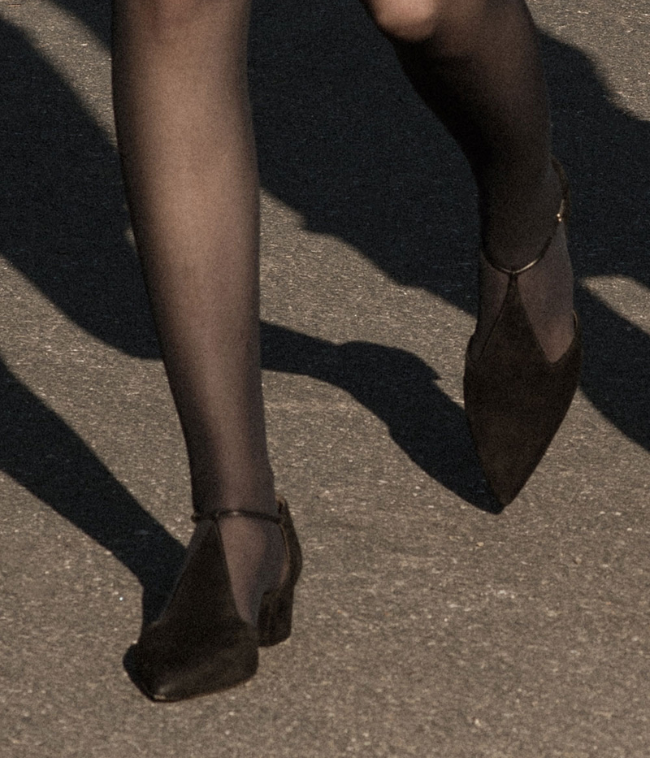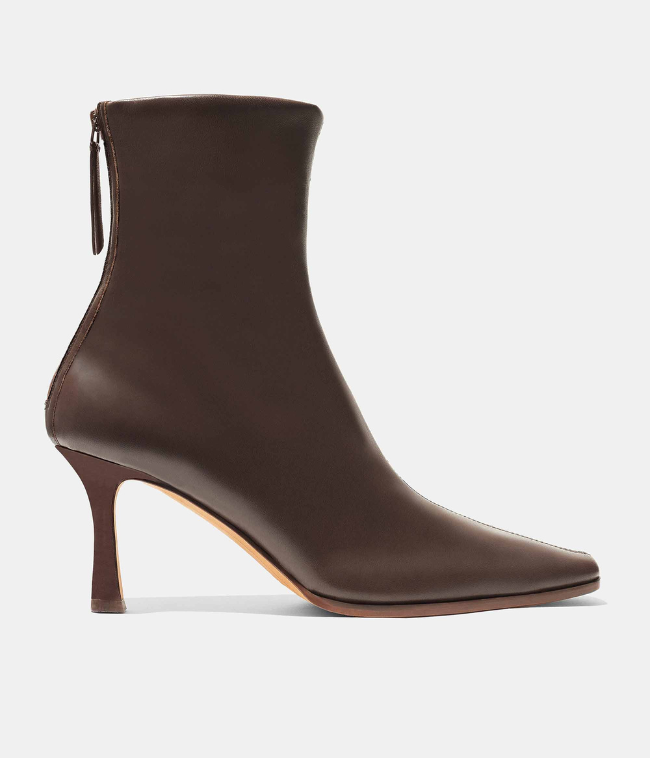Dina Nur Satti
 Photos: Nadia Bautista
Photos: Nadia Bautista
Dina Nur Satti is a Brooklyn-based ceramic artist born to Sudanese and Somali parents, and raised between France and Kenya. Her vessels — bold and soft shapes that evoke the natural world — are inspired by her collegiate study of African art and pre-colonial African societies. It was through that work that Dina developed an interest in ritual objects that informs her own practice. She continues to travel throughout Africa to learn about methods of craftsmanship and ceremony.
Gravitating to both clean lines and feminine silhouettes in her wardrobe, Dina’s sartorial choices are an element of her own self-care: light, muted, and airy pieces that make her feel peaceful. To accompany them, Dina wears the two styles of the Susan sandal: the original, and the Susan Tread. Here, she tells us more about her aesthetic, her art practice, and what’s inspiring her now.
How would you describe your style?
I have two style archetypes, a more masculine clean lines and structural side and then a more flowy, feminine side. I fluctuate between the two. It expresses itself in a lot of my life from fashion, to music, to experiences. I love the interplay of opposing energies and how they allow different aspects of ourselves to express themselves.
Can you tell us about Nur Ceramics and how it came to be?
I really believe that the evolution of an artist is non linear, so I technically started taking ceramics classes in January 2015 while I had a career in development at a foundation. For seven years prior to that I was spending a lot of time around artists in Brooklyn and assisting in producing events during my free time so I could learn from set designers and curators.
I was taking any classes that piqued my interest and just following my line of curiosity, which got me to taking my first ceramics class. After that, it all moved pretty quickly and I started selling ceramics in 2017.
Has growing up in Kenya & France played a role in Nur Ceramics?
Growing up between Africa and Europe has informed so much of my world view. It is through my studies of objects that I started to explore the history of Africa that we aren’t taught in school.
A lot of my work is inspired by my research on and interest in decolonization work as well as encouraging my audience to challenge the narratives we accept as truth.
I always felt a sense of conflicting identity as a result of growing up between several cultures, which is something anyone who has immigrated to a new country deals with. I teach classes on ‘The Spiritual Essence of Pottery’ in which I also talk about the greater lack of belonging that everyone feels that can only be relieved by connecting with community and experiencing healthy and vulnerable shared spaces.
The Western culture we are a part of doesn’t prioritize the well being of individuals and community, which I personally believe is why so many people are dealing with depression, anxiety, loneliness etc. 
Favorite summer travel destination?
My favorite beach in the world is the Indian Ocean on the Eastern Coast of Africa. Kenya and Tanzania are where I usually go. It’s home and one of the most beautiful places in the world. Zanzibar is the most known destination there, but there are so many places to discover. Because it’s below the equator, ‘summer’ is technically during the US winter season.
What is currently inspiring you? Sartorially, culturally or otherwise?
When it comes to what I wear, I’m really inspired by muted colors at the moment. I wore so much black for so many years living in NYC I’m now gravitating towards lighter colors that make me feel open and at peace.
What is your current favorite shoe from Emme Parsons, and how would you style it?
I love the Susan in Tobacco. It reminds me of warm vacation destinations. I’m really into light caftans and dress robes in the summer. I would style the shoes with a light, warm colored caftan, or calf length jumpsuit. I love the two styles of the Susan sandal. The classic Susan has a date night feel while the Susan Tread is a little more edgy.
Guilty or not so guilty pleasure?
Taking hours in the morning before I can get to the studio! I can wake up at 6:30am but still not go to the studio until 11am. I still feel guilty but this is my time for self-care and grounding before I start my day. I’m continuously reminding myself that everyone is different and that I have to follow my natural pace. That in and of itself is an act of decolonization!
Last great book that you read?
The Awakened Brain by Lisa Miller. My friend Cor Garcia-Held, co-founder of the Brooklyn ceramics studio Gasworks NYC introduced me to it and it presents scientific research on spirituality and how our brains are wired towards a mystical sense of spirituality with a basis in our connection to nature and the world around us. It’s really amazing!


